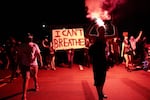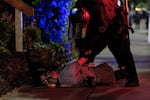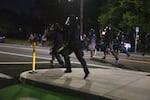If newly elected Multnomah County District Attorney Mike Schmidt had unlimited resources, the roughly 550 pending misdemeanor and felony charges brought against protesters since May 29 would be handled a little differently than your typical prosecution.
“I’d be baking in some more restorative justice,” Schmidt said. “And maybe even more community involvement in the resolution of these cases ... to kind of honor the fact that they were there protesting and wanting to be heard. And then creating a venue where they could do that as part of some sort of negotiated dismissal.”

Mike Schmidt
Courtesy of Chris Mueller
The DA’s office, however, does not have unlimited resources. Besides the tsunami of arrests from 74 nights of continuous protests against systemic racism and police violence, July marked the deadliest month in Portland in 30 years and saw a dramatic increase in shootings in the city.
Related: As nightly conflicts in Portland draw headlines, reforms gradually advance
Since he can’t initiate an expansive restorative justice program, Schmidt introduced a new policy Tuesday that will result in dropping a significant portion of the more than 500 protester cases brought over the course of the demonstrations.
“In a democracy where speech is so important, being the system that’s being criticized and then using that system to shut down speech,” Schmidt said, “I think we have to hold ourselves to an even higher level of tolerance for that speech to take place.”
Barring unusual circumstances, prosecutors under Schmidt’s new policy won’t press charges for city ordinance violations that do not involve deliberate property damage, theft, or the use or threat of force against another person. That would include charges such as interference with a police officer or disorderly conduct.
“The presumption on a lot of these cases that are listed out there is that we won’t prosecute,” Schmidt said. “But if there are egregious circumstances or something about the case that stands out, we can always choose to prosecute.”

Demonstrators marched through the streets of Portland, Ore., Friday, May 29, 2020, joining nationwide protests against the killing of George Floyd at the hands of Minneapolis police.
Jonathan Levinson / OPB
Arrests for resisting arrest or assaulting a public safety officer should consider “the chaos of a protesting environment, especially after tear gas or other less-lethal munitions have been deployed against protestors en masse,” the policy states. Schmidt said his attorneys will scrutinize every case to determine if the person’s intent was to resist arrest or injure a police officer.
In cases where the primary harm was financial and not physical, Schmidt is calling for charges to be dropped after victims have been compensated or the arrestee has otherwise made amends to the community.
“We’re going to give people three months to make it right, to work with the victim to pay back any restitution,” Schmidt said. “And if those things can happen or we can come up with a restorative resolution, we’re going to dismiss those cases.”
To help people avoid the repercussions of having an arrest record, Lewis and Clark Law School students are going to work with the Multnomah County District Attorney’s Office to make sure people who are eligible know how to expunge their records.
Related: Multnomah County DA declines charges against Demetria Hester
Schmidt, who took office a week ago after his predecessor unexpectedly announced an early retirement, said he worked with members of his transition team, activists involved in the protest movement and attorneys in the DA’s office to draft the policy.
After 74 days of protest, Schmidt said the Portland Police Bureau and Multnomah County Sheriff’s Office expressed concern the policy would be interpreted as condoning violence.
“I understand what they’re concerned about,” Schmidt said. “But at the same time, they have their job and their duties, and that means that they will make an arrest when they see that the law’s been broken. And then I have my job and my duties, which is to have the discretion on whether or not to pursue charges.”
Oregon state police officer gives this reporter an arrest warning. To note: I am on the sidewalk and there are press around me. pic.twitter.com/K8NRyh0Mg6
— Sergio Olmos (@MrOlmos) August 11, 2020
While the DA laid out a plan to drop charges against a significant number of protesters, observers say local law enforcement officers are making more arrests for what appear to be arbitrary reasons. They’re also pushing a legal envelope.
Since Thursday, police have arrested at least three journalists and an ACLU legal observer. That comes despite the Portland Police Bureau being under a temporary restraining order issued by a federal judge, limiting the Bureau’s interactions with the press and legal observers.
That order prohibits PPB “from arresting, threatening to arrest, or using physical force directed against any person whom they know or reasonably should know is a Journalist or Legal Observer, unless the Police have probable cause to believe that such individual has committed a crime.”
“I’ve worked in literal war zones,” said New York-based photojournalist Maranie Staab, who covered the battle for Mosul in 2017 and has photographed for the New York Times, The Atlantic and Vice. “And I’ve not seen or experienced anything like what I have in Portland.”

Portland police officers arrested freelance journalist Justin Yau while he reported on a protest June 30, 2020.
Courtesy of Alex Milan Tracy
On Thursday, Staab was at a protest outside the bureau’s East Precinct building when police ordered the crowd to disperse. She said she was walking backward in front of a line of police and taking photographs when she turned around to walk around a dumpster.
She was grabbed from behind, tackled to the ground and arrested.
“I don’t know if I was targeted or if they just wanted to arrest somebody,” Staab said.
When she asked why she was being arrested, the arresting officer told her she had tried to hit him, a claim she says “couldn’t be more wrong.”
Staab was ultimately charged with harassment and interference with a police officer, both of which the DA is unlikely to prosecute based on the new policy.
An ACLU legal observer arrested early Sunday morning was charged with interfering with a peace officer, resisting arrest and attempted assault on a police officer, a charge which may be prosecuted depending on the details of the investigation.

Protesters gathered in front of the Portland Police Association on day 68 of protests against systemic racism and police violence.
Jonathan Levinson / OPB
The DA can ultimately decide whether or not to prosecute those charges, but Schmidt said under the current system, he has no investigative power of his own — a problem when it comes to cases involving police officers.
He points to San Francisco, where newly elected progressive District Attorney Chesa Boudin has an investigative team that only handles police cases. Schmidt said he supports a proposal lawmakers are considering that would place responsibility for police shooting investigations in the hands of the attorney general.
Related: Portland leaders send measure to create new police oversight board to November ballot
Schmidt said a lot of the major overhauls to the criminal justice system that protesters are talking about were central themes of his campaign, and he thinks it’s important for the community to hear their emotional message. He also recognizes that the city’s current approach to protests isn’t seeing much progress by any metric.
“I do know just from being an observer of what’s happened so far, that it seems that every time force is escalated, the protests get larger and more tumultuous,” Scmidt said, making an observation commonly heard from protesters.
Ultimately, he said, he hopes the new policy will be viewed as a de-escalation.

